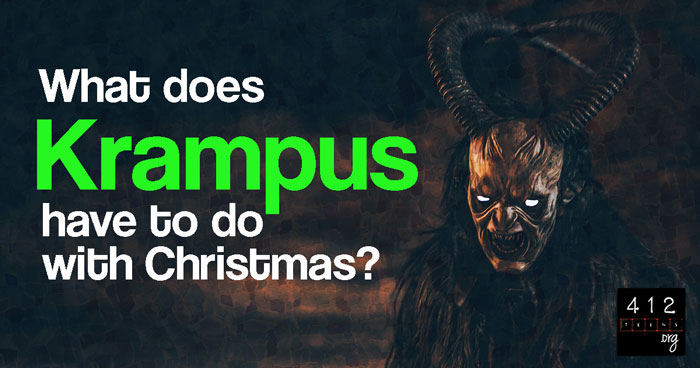What is Krampus? What does Krampus have to do with Christmas?

Krampus is a demonic figure birthed from Austrian/Eastern European folklore that can be summarized as "the anti-Santa Claus." According to this mythos, while St. Nicholas (classic Santa Claus) spreads joy and gives presents to good boys and girls at Christmas time, Krampus visits homes to punish disobedient children. The appearance of Krampus in folklore varies a bit, but generally he is shown as an upright goat figure with wicked, curved horns, a long tongue, plus one human foot and one cloven hoof. He may leave bundles of birch sticks for bad kids or even beat them with the sticks. The Krampus legend also speaks of him drowning children in baskets, devouring them, and dragging them to hell.
Fairy tales, myths, and legends of demons and monsters punishing or devouring children are common throughout all cultures. What makes Krampus unique is the growing popularity of the Krampusnacht (Night of Krampus) celebrations in the Alpine region (and parts of Germany) that celebrate the day of Krampus' reign (December 5). On this day, villagers dress up as the Krampus figure and chase onlookers, beating anyone unlucky enough to get caught on the legs with birch stick bundles. While the festival is said to be all in "good fun," onlookers are likely to leave sore and bruised if they caught the eye of a Krampus player.
The origin of Krampus has never been 100% determined, though there are theories he originated from Nordic paganism. Regardless of origin and despite an attempt in 1923 Austria by the Fascist Christian Social Party to ban Krampus altogether, Krampus has persisted as an icon of European folklore used by parents to scare their children into behaving. Like other cultural "boogeymen," good behavior will ideally lead to being passed over by Krampus and, instead, finding presents and rewards from St. Nicholas on December 6 (traditionally, St. Nicholas Day).
In the last ten years, the Krampus myth has traveled overseas to the United States to increased popularity, even leading to a Universal Studios film, Krampus (2015) with Adam Scott. Nowadays, Krampusnacht festivals have cropped up in certain areas of the United States, bringing a bit of Halloween into the Christmas season.
Studying different cultural festivals and icons is never boring, and teaching children the value of obedience is an important aspect in educating them about discernment and keeping them safe (Ephesians 6:1-3). However, the festival of Krampusnacht raises a lot of red flags in its literal celebration of devil worship and promotion of debauchery and abuse—even if it's "all in good fun." God is the God of love—not a God who rejoices in the pain of others (Psalms 34:18; Psalm 10:17-18).
Secondly, while fear may seem like a good motivator in keeping children or our younger siblings safe, fearmongering can lead to long-term dysfunctionality. Instead, we have repeated, beautiful opportunities to share the compassion, grace, and love of Christ through forgiveness, gentleness, and boundaries as they go through the difficult task of growing up (Ephesians 6:4). The focus of Christmas should never be about punishment (or rewards for that matter) but rather a celebration of our greatest gift: Jesus Christ (Matthew 1:21).


TL;DR
Krampus is a part-goat, part-devil figure in Austrian/Eastern European folklore that is often summarized as "the anti-Santa Claus." Krampusnacht is December 5, the "Night of Krampus," when Krampus punishes bad boys and girls before St. Nicholas Day (December 6). Krampus is known for scaring, beating, eating, or even drowning "bad" children; he is the Austrian boogeyman. The popularity of Krampus has recently made its way to the United States, leading to Krampusnacht festivals. While all cultures are unique, it's important to remember that abuse, fear, and the literal devil worship of Krampus is at odds with the Christian faith and the character of God (Psalms 34:18; Psalms 10:17-18). Additionally, while obedience is important for children (Ephesians 6:1-3) as they grow in discernment and need extra safety nets, scaring them into obedience leads to dysfunctionality (Ephesians 6:4) rather than a foundation of security in God's love and care.

Writer/Editor: September Grace
September is an avid film nerd from growing up on weekend trips to Universal Studios Hollywood. She is passionate about the intersections of Christian spirituality, faith, and storytelling in popular culture. Outside of 412teens and digging up obscure horror flicks from the 2000s, she works as a freelance developmental editor and acquisitions consultant while comforting her clingy feline floof, Faust, from the anxiety of existence.
